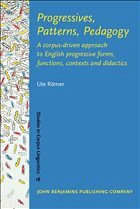Nicht lieferbar

Progressives, Patterns, Pedagogy
A corpus-driven approach to English progressive forms, functions, contexts and didactics
Versandkostenfrei!
Nicht lieferbar
Main description:This book presents a large-scale corpus-driven study of progressives in 'real' English and 'school' English, combining an analysis of general linguistic interest with a pedagogically motivated one. A systematic comparative analysis of more than 10,000 progressive forms taken from the largest existing corpora of spoken British English and from a small corpus of EFL textbook texts highlights numerous differences between actual language use and textbook language concerning the distribution of progressives, their preferred contexts, favoured functions, and typical lexical-grammati...
Main description:
This book presents a large-scale corpus-driven study of progressives in 'real' English and 'school' English, combining an analysis of general linguistic interest with a pedagogically motivated one. A systematic comparative analysis of more than 10,000 progressive forms taken from the largest existing corpora of spoken British English and from a small corpus of EFL textbook texts highlights numerous differences between actual language use and textbook language concerning the distribution of progressives, their preferred contexts, favoured functions, and typical lexical-grammatical patterns. On the basis of these differences, a number of pedagogical implications are derived, the integration of which then leads to a first draft of an innovative concept of teaching progressives - a concept which responds to three key criteria in pedagogical description: typicality, authenticity, and communicative utility. The analysis also demonstrates that many existing accounts of the progressive are inappropriate in several respects and that not enough attention is being paid to lexical-grammatical relations.! Winner of the "Wissenschaftspreis Hannover 2006" for outstanding research monographs !
Table of contents:
- Acknowledgements
- 1. Introduction
- 2. The theoretical basis of the study
- 3. Progressives in theoretical studies and grammars of English
- 4. Progressives in spoken British English
- 5. Progressive teaching
- 6. Progressives in real spoken English and in 'school' English
- 7. Pedagogical implications
- 8. Conclusions
- Notes
- References
- Index
This book presents a large-scale corpus-driven study of progressives in 'real' English and 'school' English, combining an analysis of general linguistic interest with a pedagogically motivated one. A systematic comparative analysis of more than 10,000 progressive forms taken from the largest existing corpora of spoken British English and from a small corpus of EFL textbook texts highlights numerous differences between actual language use and textbook language concerning the distribution of progressives, their preferred contexts, favoured functions, and typical lexical-grammatical patterns. On the basis of these differences, a number of pedagogical implications are derived, the integration of which then leads to a first draft of an innovative concept of teaching progressives - a concept which responds to three key criteria in pedagogical description: typicality, authenticity, and communicative utility. The analysis also demonstrates that many existing accounts of the progressive are inappropriate in several respects and that not enough attention is being paid to lexical-grammatical relations.! Winner of the "Wissenschaftspreis Hannover 2006" for outstanding research monographs !
Table of contents:
- Acknowledgements
- 1. Introduction
- 2. The theoretical basis of the study
- 3. Progressives in theoretical studies and grammars of English
- 4. Progressives in spoken British English
- 5. Progressive teaching
- 6. Progressives in real spoken English and in 'school' English
- 7. Pedagogical implications
- 8. Conclusions
- Notes
- References
- Index




